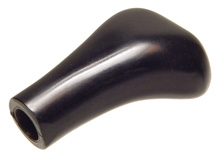
You don’t have to buy new handles for machines, equipment or workpieces. While replacing the existing handles with new handles is always an option, another idea is to choose handle sleeves.
Handle sleeves are designed for use with existing handles. They consist of a shell or “sleeve” that’s applied over a handle. Standard handles, of course, are solid. Handle sleeves are hollow, which allows them to fit over a handle. Below are several tips on how to choose handle sleeves.
Match the Hole Depth With the Handle Length
The hole depth of a given handle sleeve should match the length of the handle with which it’s used. As previously mentioned, handle sleeves are hollow. Hole depth refers to the depth of a handle sleeve’s hollow interior.
Because handle sleeves are used with handles, the hole depth needs to match the handle length. A shallow hole depth will leave some of the handle exposed. Handle sleeves that are too deep, conversely, will fit loosely.
Tapped vs Untapped
You can find handle sleeves available in tapped and untapped styles. Tapped handle sleeves are characterized by the use of threading. They have internal threading within their hollow interior. You can connect a tapped handle sleeve to a threaded handle.
Untapped handle sleeves, on the other hand, don’t have threading. They aren’t connected to threaded handles. Instead, they are connected to other types of handles. Regardless, most handle sleeves can be classified as either tapped or untapped. Tapped handle sleeves have threading, whereas untapped handle sleeves do not.
Consider the Finish
You should consider the finish when choosing handle sleeves. Most handle sleeves feature an outer layer. Known as a finish, it improves their aesthetics while also protecting them from damage.
Some handle sleeves have a powder-coated finish, for instance. They are blasted with powder particles that, after being cured, solidify on the surface. With a powder-coated finish, handle sleeves are attractive, ergonomic and long-lasting.
Chemical Resistance
If you’re planning to use them on machinery handles, you may want to choose handle sleeves that are resistant to common chemicals. Machines often contain chemicals. Some of them contain oil, solvents, grease and coolant. When exposed to these chemicals, handle sleeves may degrade.
Fortunately, there are handle sleeves available that are resistant to common chemicals such as these. They can withstand exposure to common chemicals without damaging or otherwise degrading.
